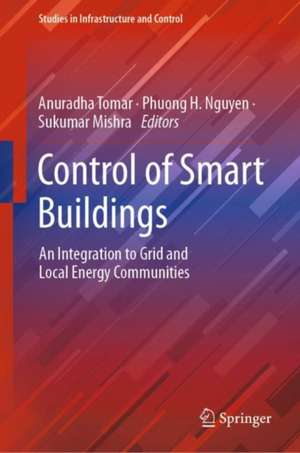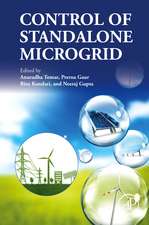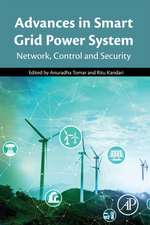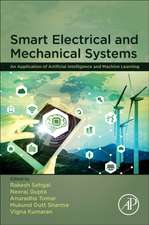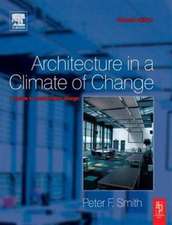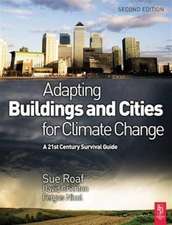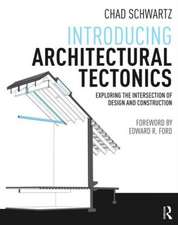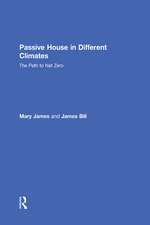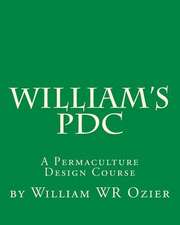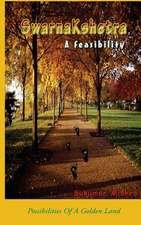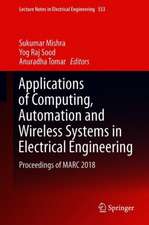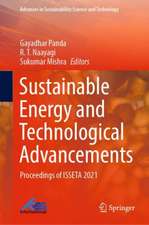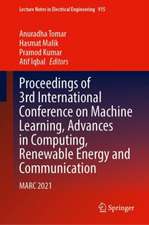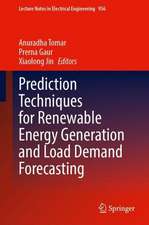Control of Smart Buildings: An Integration to Grid and Local Energy Communities: Studies in Infrastructure and Control
Editat de Anuradha Tomar, Phuong H. Nguyen, Sukumar Mishraen Limba Engleză Hardback – 10 mai 2022
| Toate formatele și edițiile | Preț | Express |
|---|---|---|
| Paperback (1) | 1107.25 lei 6-8 săpt. | |
| Springer Nature Singapore – 11 mai 2023 | 1107.25 lei 6-8 săpt. | |
| Hardback (1) | 1113.39 lei 6-8 săpt. | |
| Springer Nature Singapore – 10 mai 2022 | 1113.39 lei 6-8 săpt. |
Preț: 1113.39 lei
Preț vechi: 1357.80 lei
-18% Nou
Puncte Express: 1670
Preț estimativ în valută:
213.05€ • 221.00$ • 177.66£
213.05€ • 221.00$ • 177.66£
Carte tipărită la comandă
Livrare economică 27 martie-10 aprilie
Preluare comenzi: 021 569.72.76
Specificații
ISBN-13: 9789811903748
ISBN-10: 9811903743
Pagini: 270
Ilustrații: XII, 270 p. 151 illus., 116 illus. in color.
Dimensiuni: 155 x 235 mm
Greutate: 0.58 kg
Ediția:1st ed. 2022
Editura: Springer Nature Singapore
Colecția Springer
Seria Studies in Infrastructure and Control
Locul publicării:Singapore, Singapore
ISBN-10: 9811903743
Pagini: 270
Ilustrații: XII, 270 p. 151 illus., 116 illus. in color.
Dimensiuni: 155 x 235 mm
Greutate: 0.58 kg
Ediția:1st ed. 2022
Editura: Springer Nature Singapore
Colecția Springer
Seria Studies in Infrastructure and Control
Locul publicării:Singapore, Singapore
Cuprins
An Introduction to Smart Building Energy Management.- The Influence of the Increasing Penetration of Photovoltaic Generation on Integrated Transmission-Distribution Power Systems.- Building Energy Management.- Demand-side Management And Peak Load Reduction.- Demand Response in Smart Buildings.- Building Services with the Local Energy Community- Applications.- Energy Solutions for Smart Buildings Integrated with Local Energy Communities.- Advanced Technologies for Smart Building Management: Linking Building Components and Energy Use.- Applications to Building Services with the Local Energy Community.- Optimization in Grid-Interactive Buildings.- Cost-Benefit and Short-term Power Flow Analysis of Grid Integrated Residential Photovoltaic-Battery Energy System.
Notă biografică
Dr. Anuradha Tomar currently working as Assistant Professor in Instrumentation & Control Engineering Division of Netaji Subhas University, Delhi, India. Dr. Tomar has completed her Postdoctoral research in Electrical Energy Systems Group, from Eindhoven University of Technology (TU/e), the Netherlands and has successfully completed European Commission’s Horizon 2020, UNITED GRID and UNICORN TKI Urban Research projects. She has completed her PhD in Electrical Engineering from Indian Institute of Technology Delhi, India. Her areas of research interest are Operation & Control of Microgrids, Photovoltaic Systems, Renewable Energy based Rural Electrification, Congestion Management in LV Distribution Systems, Artificial Intelligent & Machine Learning Applications in Power System, Energy conservation and Automation. She has authored or co-authored many research papers in Journals/Conferences of repute. She is an Editor for books with International Publication like Springer, Elsevier. Dr. Tomar is Senior member of IEEE, Life member of ISTE, IETE, IEI, and IAENG.
Dr. Phuong Nguyen is Associate Professor with the research group Electrical Energy Systems at the TU/e department of Electrical Engineering. His research interests include applications of ICT in smart energy systems, distributed state estimation, control and operation of the power system, distributed and computational intelligence, and applications in the future power delivery system. He is Founder of the digital Power & Energy Systems lab (digi-PES) which aims to enable an energy transition from micro-energy grids towards the future integrated energy system. This laboratory environment is a cyber-physical ecosystem for students and researchers to explore innovations in various energy-related aspects of (but not limited to) nano/micro-grids, local energy communities, local flexibility/energy markets, optimal power/energy flow, and congestion management. Hand-in-hand with emerging (big) data and Internet of things (IoT) domains, such research provides a foundation for comprehensive data-driven and inter-dependency models of energy system integration.
Dr. Sukumar Mishra is Professor and Associate Dean R&D at Indian Institute of Technology Delhi and has won many accolades throughout his academic tenure of 27 years. He has been Recipient of Young Scientist award by Orissa Bigyan Academy, INSA medal for young scientist, INAE young engineer award, INAE silver jubilee young engineer award, The Samanta Chandra Shekhar award, Bimal Bose award and NASI-Reliance Platinum Jubilee award. He has been selected as Mission Innovation National Champion (2019) under the mission innovation initiative to accelerate clean energy in India. He is also Fellow of the NASI, INAE, IET, IETE and IE. Professor Mishra is Great Enthusiast of innovation and recently has incorporated a new company named SILOV SOLUTIONS PRIVATE LIMITED. Professor Mishra’s research expertise lies in thefield of power systems, power quality studies, renewable energy and smart grid. Professor Mishra has authored more than 80 IEEE transactions/journals, 30 IET journals and 30 other international journal papers.
Dr. Phuong Nguyen is Associate Professor with the research group Electrical Energy Systems at the TU/e department of Electrical Engineering. His research interests include applications of ICT in smart energy systems, distributed state estimation, control and operation of the power system, distributed and computational intelligence, and applications in the future power delivery system. He is Founder of the digital Power & Energy Systems lab (digi-PES) which aims to enable an energy transition from micro-energy grids towards the future integrated energy system. This laboratory environment is a cyber-physical ecosystem for students and researchers to explore innovations in various energy-related aspects of (but not limited to) nano/micro-grids, local energy communities, local flexibility/energy markets, optimal power/energy flow, and congestion management. Hand-in-hand with emerging (big) data and Internet of things (IoT) domains, such research provides a foundation for comprehensive data-driven and inter-dependency models of energy system integration.
Dr. Sukumar Mishra is Professor and Associate Dean R&D at Indian Institute of Technology Delhi and has won many accolades throughout his academic tenure of 27 years. He has been Recipient of Young Scientist award by Orissa Bigyan Academy, INSA medal for young scientist, INAE young engineer award, INAE silver jubilee young engineer award, The Samanta Chandra Shekhar award, Bimal Bose award and NASI-Reliance Platinum Jubilee award. He has been selected as Mission Innovation National Champion (2019) under the mission innovation initiative to accelerate clean energy in India. He is also Fellow of the NASI, INAE, IET, IETE and IE. Professor Mishra is Great Enthusiast of innovation and recently has incorporated a new company named SILOV SOLUTIONS PRIVATE LIMITED. Professor Mishra’s research expertise lies in thefield of power systems, power quality studies, renewable energy and smart grid. Professor Mishra has authored more than 80 IEEE transactions/journals, 30 IET journals and 30 other international journal papers.
Textul de pe ultima copertă
This book provides an overview of how efficient building energy management can be done, considering the increasing importance of renewable energy integration. It also includes the grid-interactive building, their control, energy management, and optimization techniques to promote better understanding among researchers and business professionals in the utility sector and across industries. This book is written and edited by leading specialists active in concurrent developments in smart building management, renewable energy research, and application-driven R&D. The experiences and research work shared help the readers in enhancing their knowledge in the field of renewable energy, power engineering, building energy management, demand, and supply management and learn the technical analysis of the same in an insightful manner. Additionally, established and emerging applications related to applied areas like smart cities, the Internet of things, machine learning, artificial intelligence, etc., are developed and utilized to demonstrate recent innovations in smart building energy management.
Caracteristici
Helps the readers to enhance their knowledge in renewable energy, power engineering, quality and reliability Features contributions from key opinion leaders, successful researchers, academicians, and industry experts Provides emerging concepts to deal with latest issues in the fields of renewable energy integration
